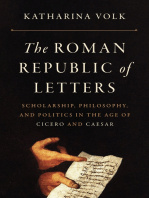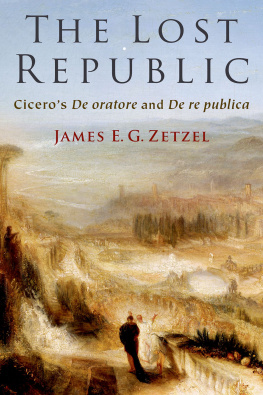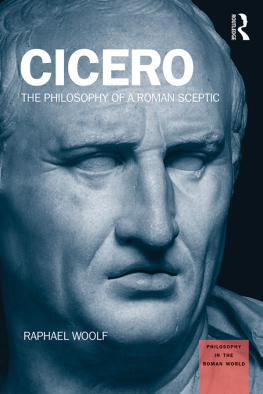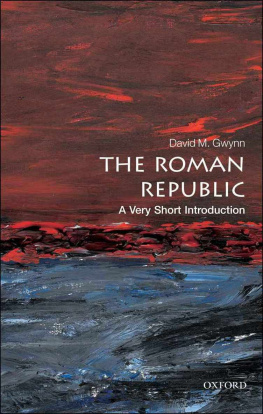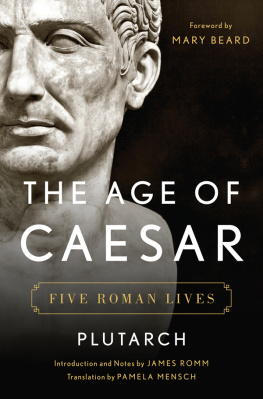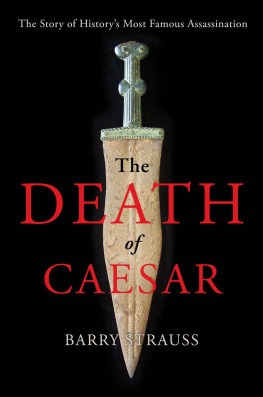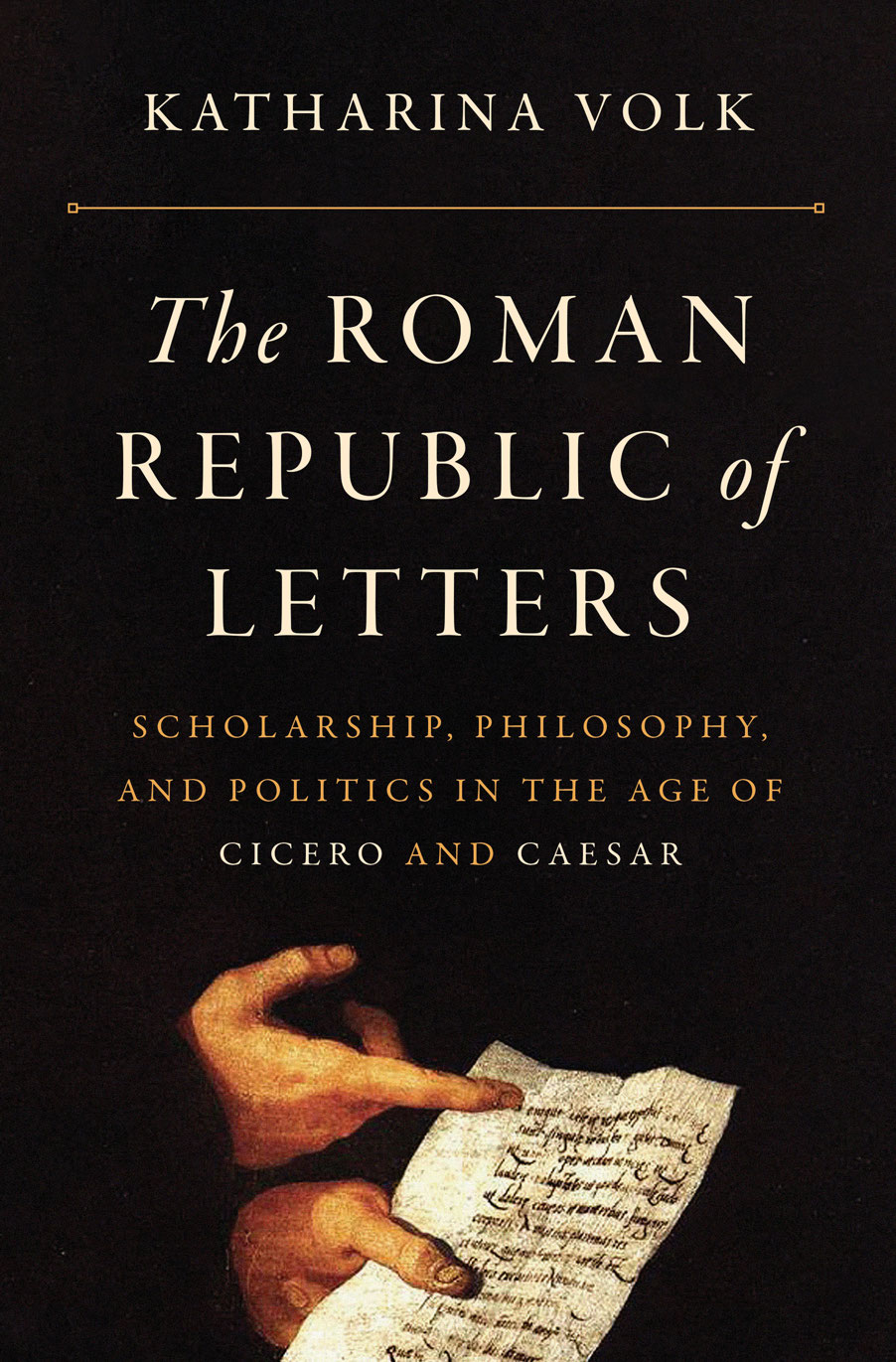
THE ROMAN REPUBLIC OF LETTERS
The Roman Republic of Letters
SCHOLARSHIP, PHILOSOPHY, AND POLITICS IN THE AGE OF CICERO AND CAESAR
KATHARINA VOLK
PRINCETON UNIVERSITY PRESS
PRINCETON & OXFORD
Copyright 2021 by Katharina Volk
Princeton University Press is committed to the protection of copyright and the intellectual property our authors entrust to us. Copyright promotes the progress and integrity of knowledge. Thank you for supporting free speech and the global exchange of ideas by purchasing an authorized edition of this book. If you wish to reproduce or distribute any part of it in any form, please obtain permission.
Requests for permission to reproduce material from this work should be sent to permissions@press.princeton.edu
Published by Princeton University Press
41 William Street, Princeton, New Jersey 08540
6 Oxford Street, Woodstock, Oxfordshire OX20 1TR
press.princeton.edu
All Rights Reserved
Library of Congress Cataloging-in-Publication Data
Names: Volk, Katharina, 1969 author.
Title: The Roman republic of letters : scholarship, philosophy, and politics in the age of Cicero and Caesar / Katharina Volk.
Description: Princeton ; Oxford : Princeton University Press, [2021] | Includes bibliographical references and index.
Identifiers: LCCN 2021029270 (print) | LCCN 2021029271 (ebook) | ISBN 9780691193878 (hardback) | ISBN 9780691224343 (ebook)
Subjects: LCSH: RomeHistoryRepublic, 26530 B.C. | RomePolitics and government26530 B.C. | Learning and scholarshipRomeHistory. | Politics and cultureRomeHistory. | Politics and literatureRomeHistory. | RepublicanismRomeHistory. | RomeIntellectual life. | RomeSocial life and customs. | BISAC: PHILOSOPHY / Political | HISTORY / Ancient / Rome
Classification: LCC DG254.2 .V65 2021 (print) | LCC DG254.2 (ebook) | DDC 937/.03dc23
LC record available at https://lccn.loc.gov/2021029270
LC ebook record available at https://lccn.loc.gov/2021029271
Version 1.0
British Library Cataloging-in-Publication Data is available
Editorial: Rob Tempio & Matt Rohal
Production Editorial: Ali Parrington
Jacket Design: Karl Spurzem
Production: Erin Suydam
Publicity: Alyssa Sanford & Amy Stewart
Jacket Credit: From Portrait of Two Friends, by Jacopo Carucci (Jacopo da Pontormo), ca. 1552. Art Heritage / Alamy Stock Photo
To Jim
socio studiorum, socio uitae
CONTENTS
Prefaceix
Abbreviationsxi
Bibliography319
PREFACE
THE LEARNED Roman senators who are the subject of this book were not in the habit of prefacing their works with lists of acknowledgments. Then as now, however, intellectual activitiesresearching, writing, and publishingwere intensely social and sociable pursuits, in which individual scholars drew on extensive networks of learned friends, Greek professionals, and skilled freedmen and slaves. As I hope to show in these pages, the likes of Cicero valued the communal effort that went into their studies and liked to present themselves and their peers as engaged in an enjoyable process of (Fam. 16.21.8).
I, too, have in the course of writing this book greatly profited from the assistance of many individuals and institutions. My work has been supported by a Columbia University/Michael I. Sovern Affiliated Fellowship to the American Academy in Rome (2016), a Fellowship at the Wissenschaftskolleg zu Berlin (201617), a Heyman Center Fellowship at Columbia University (201819), and a Fellowship by the National Endowment for the Humanities (201920; I am bound to point out that any views, findings, conclusions, or recommendations expressed in this publication do not necessarily reflect those of the National Endowment for the Humanities). My profound thanks go to the grant-giving bodies, as well as to the many people affiliated with them who have furthered my research in diverse and significant ways.
I have over the years had the pleasure of presenting aspects of my work at Humboldt Universitt Berlin, Canterbury, Cologne, Columbia, Cornell, Dublin, Durham, Edinburgh, Harvard, the University of Illinois, Johns Hopkins, Munich, Penn, Penn State, Sydney, and the University of Virginia. I am most grateful to the audiences at these venues for their hospitality and for their many helpful comments.
My special thanks go to the following colleagues who have answered queries on particular points and/or have been so kind as to share unpublished material: Yelena Baraz, David Blank, Nathan Gilbert, Margaret Graver, Phillip Horky, John Izzo, Evan Jewell, Bob Kaster, Joshua Katz, Duncan MacRae, Tobias Reinhardt, James Rives, Chris van den Berg, Iakovos Vasiliou, and Gareth Williams. They have shown themselves true fellow citizens of the Republic of Letters. In addition, Nathan Gilbert, Bob Kaster, and Chris van den Berg read drafts of my manuscript either in part or in its entirety, encouraging me in the project and offering numerous valuable comments and suggestions for improvement. I am greatly in their debt.
A particular thank-you is owed to Rob Tempio at Princeton University Press for believing in this project and shepherding it so expertly to publication. Ali Parrington deftly steered the book through production, while Kim Hastings did an outstanding job as copyeditor. I am grateful also to the Presss anonymous readers for their perceptive comments, suggestions, and corrections.
One paratextual convention that was observed already by this books protagonists is the dedication: Cicero, Caesar, Varro, Brutus, and their contemporaries never published anything without highlighting a special individual to whom they felt themselves bound and who they hoped would take a personal interest in the work. This book is dedicated to the person who has lived with it and with me for a happy near-decade: Jim Zetzel, beloved husband and symphilologist extraordinaire.
KV
New York
December 2020
ABBREVIATIONS
THE FOLLOWING abbreviations for works of scholarship are used in the text and notes:
| FGRH | Jacoby, F. et al. (ed.)(1923). Fragmente der griechischen Historiker. Berlin: Weidmann/Leiden: Brill. |
| FR HIST | Cornell, T. J. (ed.) (2013). The Fragments of the Roman Historians. 3 vols. Oxford: Oxford University Press. |
| OLD | Glare, P. G. W. (ed.) (1983). Oxford Latin Dictionary. Oxford: Oxford University Press. |
| RRC | Crawford, M. H. (1974). Roman Republican Coinage. 2 vols. Cambridge: Cambridge University Press. |
Abbreviations for ancient authors and texts, unless otherwise indicated, follow those of S. Hornblower and A. Spawforth (eds.) (2012). The Oxford Classical Dictionary. 4th ed. Oxford: Oxford University Press.
Abbreviations used in the bibliography follow those of the American Journal of Archaeology 95 (1991), 116, supplemented from LAnne philologique.
THE ROMAN REPUBLIC OF LETTERS
1
Introduction
The past is an immense area of stony ground that many people would like to drive across as if it were a road, while others move patiently from stone to stone, lifting each one because they need to know what lies beneath.
JOS SARAMAGO, THE ELEPHANTS JOURNEY
1. Senator Scholars
In 54 BCE, Julius Caesar dedicated to Cicero his De analogia, a treatise in two books on the proper use of Latin. The work was to some extent a response to Ciceros De oratore, written only the year before: when laying out the qualities of the good orator, Cicero had given short shrift to the issue of linguistic correctness; Caesar, by contrast, considered this an important enough topic in its own right, proposing morphological regularity or analogy as a significant criterion in the assessment of idiomatic and elegant speech. When in 46 BCE, Cicero composed his history of Roman oratory, the Brutus, he took the occasion to come back to the debate, expressing his appreciation of the earlier dedication but also assessing Caesars own stylein a manner that, while superficially complimentary, made it clear that the two men remained far from agreement on what constituted an effective and aesthetic use of language.
Next page
